Offender Management: Effectiveness of Sentences for Dishonesty
VerifiedAdded on 2023/06/12
|13
|3908
|337
Report
AI Summary
This report provides a comprehensive analysis of offender management strategies for dishonesty offenses, examining various theories of punishment, including incapacitation, deterrence, retribution, rehabilitation, and restoration. It discusses the rationale behind custodial and community sentences, considering the severity of the offense and the offender's circumstances. The roles of governmental and non-governmental organizations in managing dishonesty offenders are explored, highlighting their collaborative efforts in prevention, rehabilitation, and social reintegration. A critical evaluation of the effectiveness of offender management in the community is presented, weighing its benefits against potential drawbacks. Examples of sentence plans and their importance in reducing reoffending are provided, along with an analysis of reoffending rates for custodial and community sentences. The report concludes with a critical evaluation of the effectiveness and management of offenders in custody, considering different types of prisons.
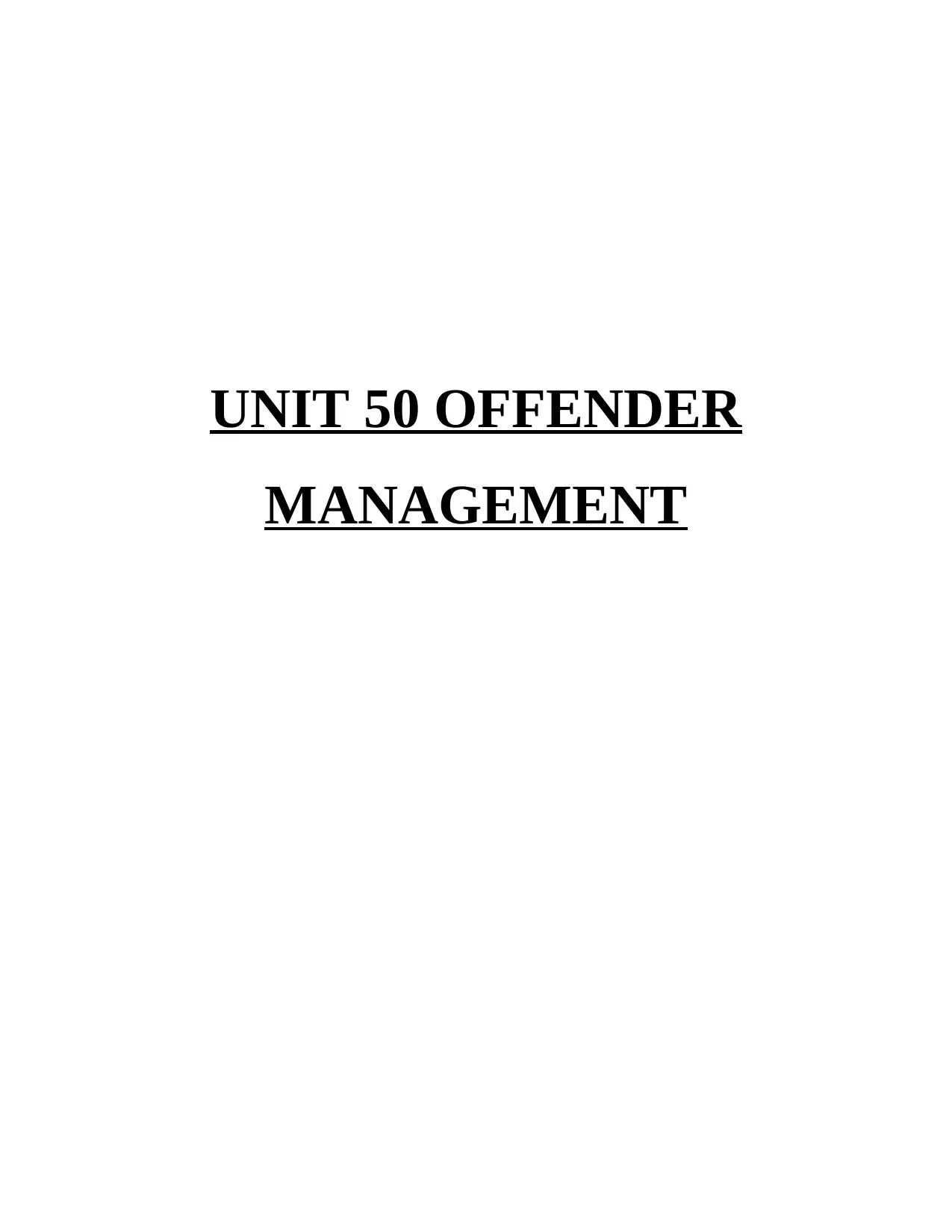
UNIT 50 OFFENDER
MANAGEMENT
MANAGEMENT
Paraphrase This Document
Need a fresh take? Get an instant paraphrase of this document with our AI Paraphraser
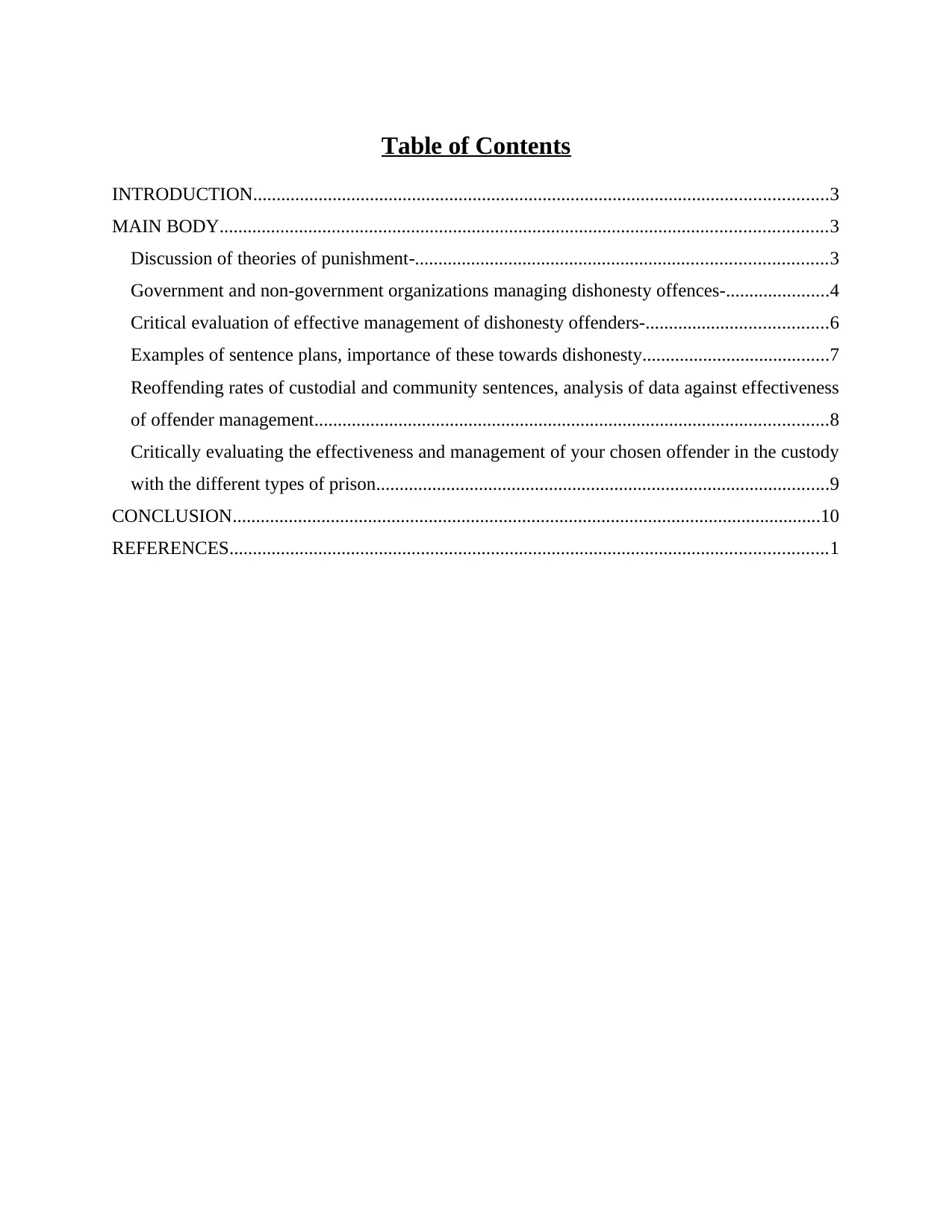
Table of Contents
INTRODUCTION...........................................................................................................................3
MAIN BODY..................................................................................................................................3
Discussion of theories of punishment-........................................................................................3
Government and non-government organizations managing dishonesty offences-......................4
Critical evaluation of effective management of dishonesty offenders-.......................................6
Examples of sentence plans, importance of these towards dishonesty........................................7
Reoffending rates of custodial and community sentences, analysis of data against effectiveness
of offender management..............................................................................................................8
Critically evaluating the effectiveness and management of your chosen offender in the custody
with the different types of prison.................................................................................................9
CONCLUSION..............................................................................................................................10
REFERENCES................................................................................................................................1
INTRODUCTION...........................................................................................................................3
MAIN BODY..................................................................................................................................3
Discussion of theories of punishment-........................................................................................3
Government and non-government organizations managing dishonesty offences-......................4
Critical evaluation of effective management of dishonesty offenders-.......................................6
Examples of sentence plans, importance of these towards dishonesty........................................7
Reoffending rates of custodial and community sentences, analysis of data against effectiveness
of offender management..............................................................................................................8
Critically evaluating the effectiveness and management of your chosen offender in the custody
with the different types of prison.................................................................................................9
CONCLUSION..............................................................................................................................10
REFERENCES................................................................................................................................1
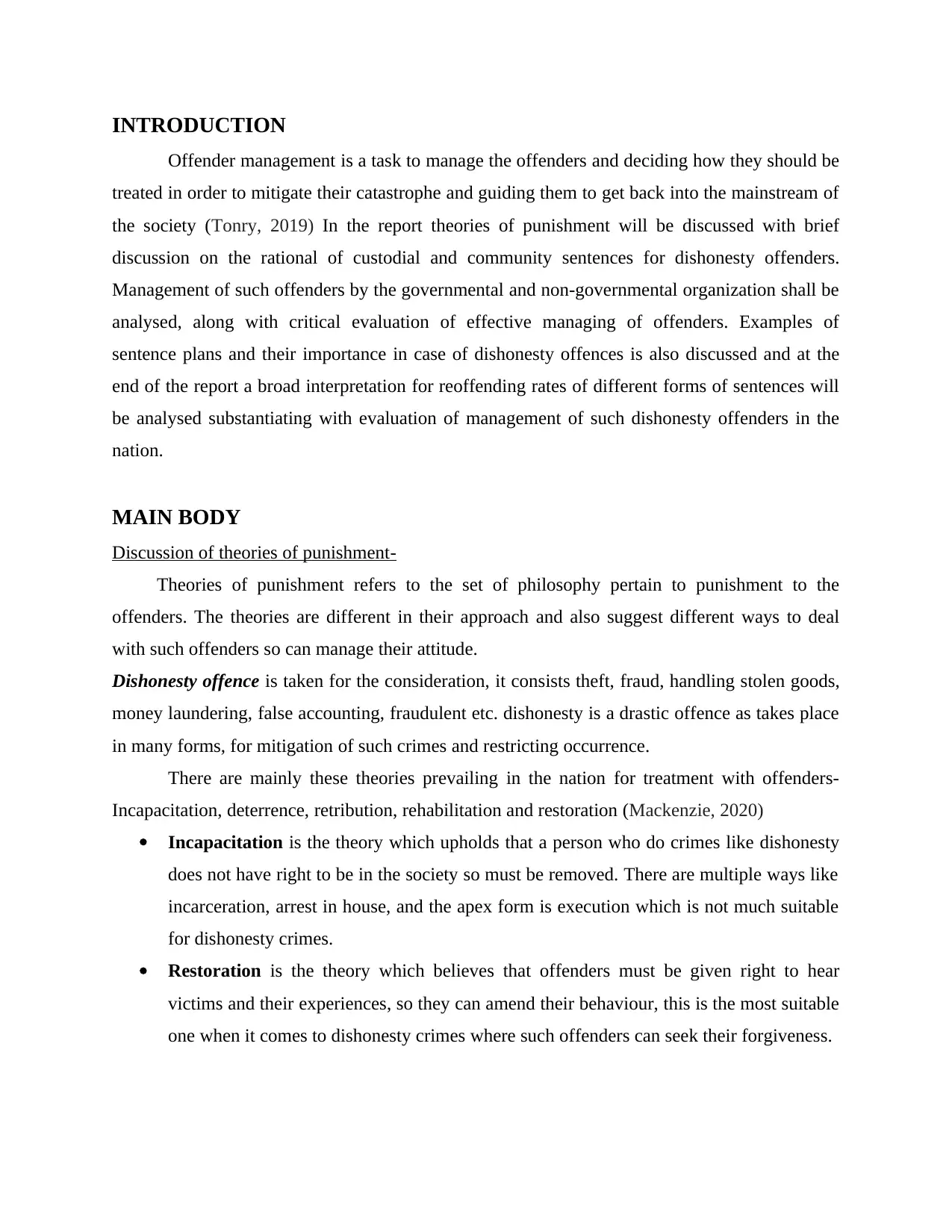
INTRODUCTION
Offender management is a task to manage the offenders and deciding how they should be
treated in order to mitigate their catastrophe and guiding them to get back into the mainstream of
the society (Tonry, 2019) In the report theories of punishment will be discussed with brief
discussion on the rational of custodial and community sentences for dishonesty offenders.
Management of such offenders by the governmental and non-governmental organization shall be
analysed, along with critical evaluation of effective managing of offenders. Examples of
sentence plans and their importance in case of dishonesty offences is also discussed and at the
end of the report a broad interpretation for reoffending rates of different forms of sentences will
be analysed substantiating with evaluation of management of such dishonesty offenders in the
nation.
MAIN BODY
Discussion of theories of punishment-
Theories of punishment refers to the set of philosophy pertain to punishment to the
offenders. The theories are different in their approach and also suggest different ways to deal
with such offenders so can manage their attitude.
Dishonesty offence is taken for the consideration, it consists theft, fraud, handling stolen goods,
money laundering, false accounting, fraudulent etc. dishonesty is a drastic offence as takes place
in many forms, for mitigation of such crimes and restricting occurrence.
There are mainly these theories prevailing in the nation for treatment with offenders-
Incapacitation, deterrence, retribution, rehabilitation and restoration (Mackenzie, 2020)
Incapacitation is the theory which upholds that a person who do crimes like dishonesty
does not have right to be in the society so must be removed. There are multiple ways like
incarceration, arrest in house, and the apex form is execution which is not much suitable
for dishonesty crimes.
Restoration is the theory which believes that offenders must be given right to hear
victims and their experiences, so they can amend their behaviour, this is the most suitable
one when it comes to dishonesty crimes where such offenders can seek their forgiveness.
Offender management is a task to manage the offenders and deciding how they should be
treated in order to mitigate their catastrophe and guiding them to get back into the mainstream of
the society (Tonry, 2019) In the report theories of punishment will be discussed with brief
discussion on the rational of custodial and community sentences for dishonesty offenders.
Management of such offenders by the governmental and non-governmental organization shall be
analysed, along with critical evaluation of effective managing of offenders. Examples of
sentence plans and their importance in case of dishonesty offences is also discussed and at the
end of the report a broad interpretation for reoffending rates of different forms of sentences will
be analysed substantiating with evaluation of management of such dishonesty offenders in the
nation.
MAIN BODY
Discussion of theories of punishment-
Theories of punishment refers to the set of philosophy pertain to punishment to the
offenders. The theories are different in their approach and also suggest different ways to deal
with such offenders so can manage their attitude.
Dishonesty offence is taken for the consideration, it consists theft, fraud, handling stolen goods,
money laundering, false accounting, fraudulent etc. dishonesty is a drastic offence as takes place
in many forms, for mitigation of such crimes and restricting occurrence.
There are mainly these theories prevailing in the nation for treatment with offenders-
Incapacitation, deterrence, retribution, rehabilitation and restoration (Mackenzie, 2020)
Incapacitation is the theory which upholds that a person who do crimes like dishonesty
does not have right to be in the society so must be removed. There are multiple ways like
incarceration, arrest in house, and the apex form is execution which is not much suitable
for dishonesty crimes.
Restoration is the theory which believes that offenders must be given right to hear
victims and their experiences, so they can amend their behaviour, this is the most suitable
one when it comes to dishonesty crimes where such offenders can seek their forgiveness.
⊘ This is a preview!⊘
Do you want full access?
Subscribe today to unlock all pages.

Trusted by 1+ million students worldwide
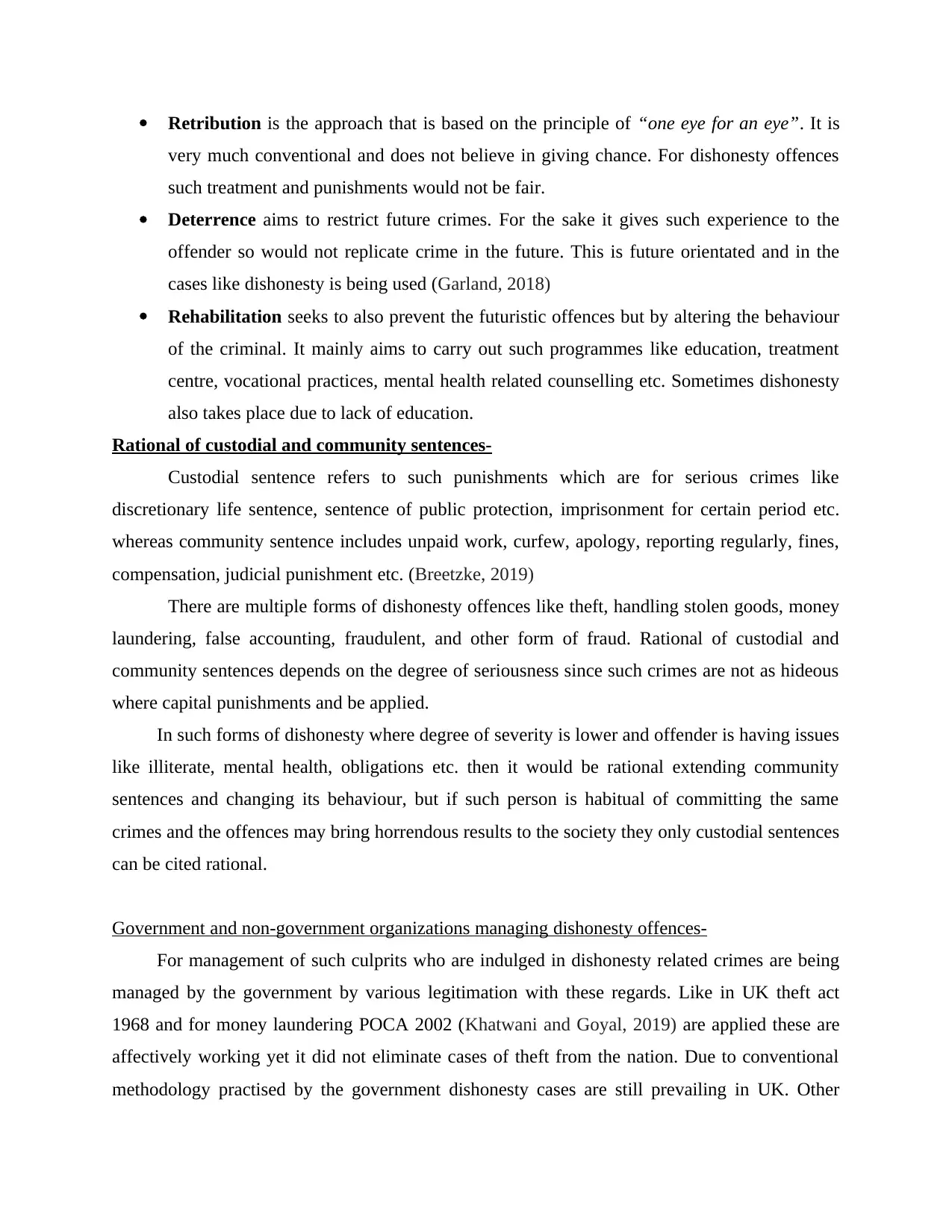
Retribution is the approach that is based on the principle of “one eye for an eye”. It is
very much conventional and does not believe in giving chance. For dishonesty offences
such treatment and punishments would not be fair.
Deterrence aims to restrict future crimes. For the sake it gives such experience to the
offender so would not replicate crime in the future. This is future orientated and in the
cases like dishonesty is being used (Garland, 2018)
Rehabilitation seeks to also prevent the futuristic offences but by altering the behaviour
of the criminal. It mainly aims to carry out such programmes like education, treatment
centre, vocational practices, mental health related counselling etc. Sometimes dishonesty
also takes place due to lack of education.
Rational of custodial and community sentences-
Custodial sentence refers to such punishments which are for serious crimes like
discretionary life sentence, sentence of public protection, imprisonment for certain period etc.
whereas community sentence includes unpaid work, curfew, apology, reporting regularly, fines,
compensation, judicial punishment etc. (Breetzke, 2019)
There are multiple forms of dishonesty offences like theft, handling stolen goods, money
laundering, false accounting, fraudulent, and other form of fraud. Rational of custodial and
community sentences depends on the degree of seriousness since such crimes are not as hideous
where capital punishments and be applied.
In such forms of dishonesty where degree of severity is lower and offender is having issues
like illiterate, mental health, obligations etc. then it would be rational extending community
sentences and changing its behaviour, but if such person is habitual of committing the same
crimes and the offences may bring horrendous results to the society they only custodial sentences
can be cited rational.
Government and non-government organizations managing dishonesty offences-
For management of such culprits who are indulged in dishonesty related crimes are being
managed by the government by various legitimation with these regards. Like in UK theft act
1968 and for money laundering POCA 2002 (Khatwani and Goyal, 2019) are applied these are
affectively working yet it did not eliminate cases of theft from the nation. Due to conventional
methodology practised by the government dishonesty cases are still prevailing in UK. Other
very much conventional and does not believe in giving chance. For dishonesty offences
such treatment and punishments would not be fair.
Deterrence aims to restrict future crimes. For the sake it gives such experience to the
offender so would not replicate crime in the future. This is future orientated and in the
cases like dishonesty is being used (Garland, 2018)
Rehabilitation seeks to also prevent the futuristic offences but by altering the behaviour
of the criminal. It mainly aims to carry out such programmes like education, treatment
centre, vocational practices, mental health related counselling etc. Sometimes dishonesty
also takes place due to lack of education.
Rational of custodial and community sentences-
Custodial sentence refers to such punishments which are for serious crimes like
discretionary life sentence, sentence of public protection, imprisonment for certain period etc.
whereas community sentence includes unpaid work, curfew, apology, reporting regularly, fines,
compensation, judicial punishment etc. (Breetzke, 2019)
There are multiple forms of dishonesty offences like theft, handling stolen goods, money
laundering, false accounting, fraudulent, and other form of fraud. Rational of custodial and
community sentences depends on the degree of seriousness since such crimes are not as hideous
where capital punishments and be applied.
In such forms of dishonesty where degree of severity is lower and offender is having issues
like illiterate, mental health, obligations etc. then it would be rational extending community
sentences and changing its behaviour, but if such person is habitual of committing the same
crimes and the offences may bring horrendous results to the society they only custodial sentences
can be cited rational.
Government and non-government organizations managing dishonesty offences-
For management of such culprits who are indulged in dishonesty related crimes are being
managed by the government by various legitimation with these regards. Like in UK theft act
1968 and for money laundering POCA 2002 (Khatwani and Goyal, 2019) are applied these are
affectively working yet it did not eliminate cases of theft from the nation. Due to conventional
methodology practised by the government dishonesty cases are still prevailing in UK. Other
Paraphrase This Document
Need a fresh take? Get an instant paraphrase of this document with our AI Paraphraser
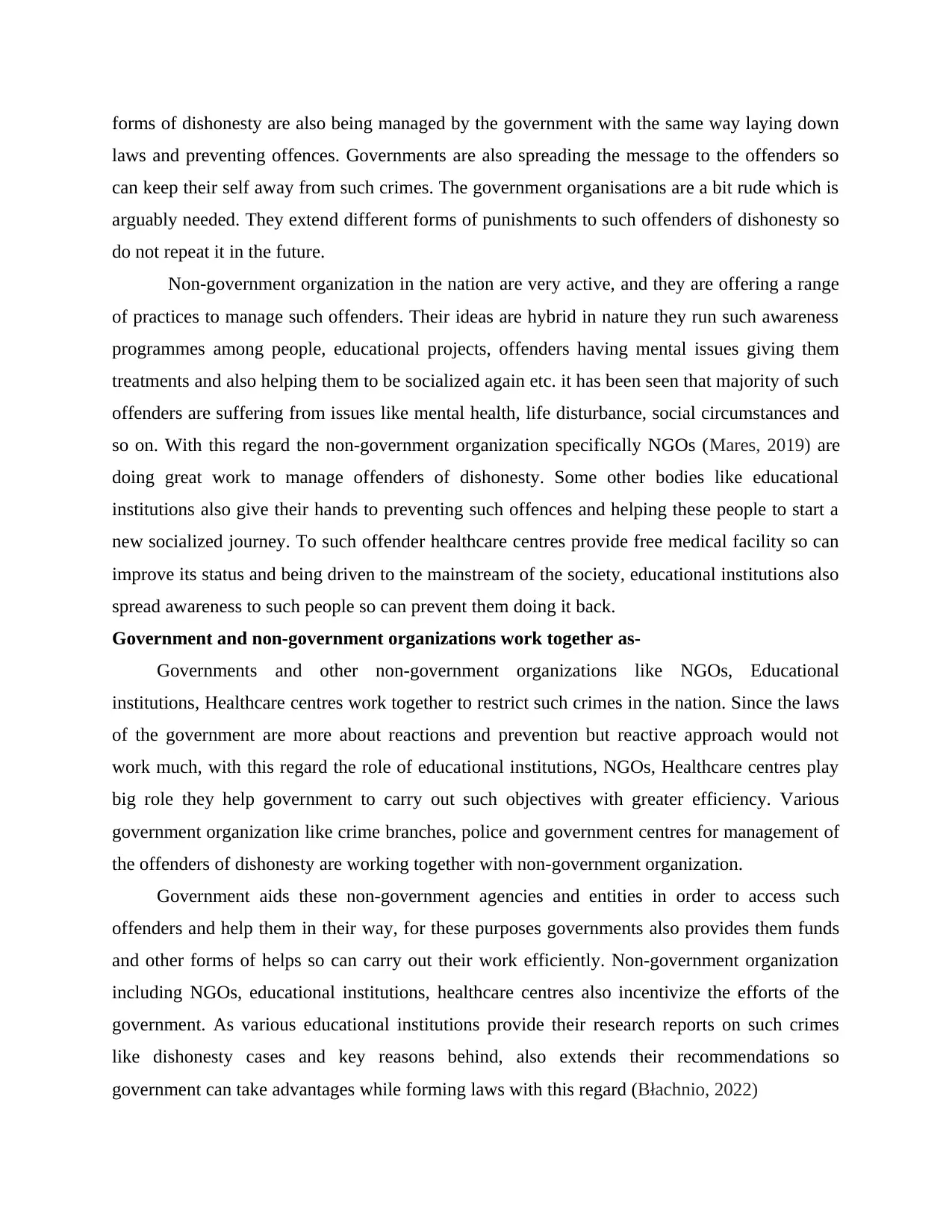
forms of dishonesty are also being managed by the government with the same way laying down
laws and preventing offences. Governments are also spreading the message to the offenders so
can keep their self away from such crimes. The government organisations are a bit rude which is
arguably needed. They extend different forms of punishments to such offenders of dishonesty so
do not repeat it in the future.
Non-government organization in the nation are very active, and they are offering a range
of practices to manage such offenders. Their ideas are hybrid in nature they run such awareness
programmes among people, educational projects, offenders having mental issues giving them
treatments and also helping them to be socialized again etc. it has been seen that majority of such
offenders are suffering from issues like mental health, life disturbance, social circumstances and
so on. With this regard the non-government organization specifically NGOs (Mares, 2019) are
doing great work to manage offenders of dishonesty. Some other bodies like educational
institutions also give their hands to preventing such offences and helping these people to start a
new socialized journey. To such offender healthcare centres provide free medical facility so can
improve its status and being driven to the mainstream of the society, educational institutions also
spread awareness to such people so can prevent them doing it back.
Government and non-government organizations work together as-
Governments and other non-government organizations like NGOs, Educational
institutions, Healthcare centres work together to restrict such crimes in the nation. Since the laws
of the government are more about reactions and prevention but reactive approach would not
work much, with this regard the role of educational institutions, NGOs, Healthcare centres play
big role they help government to carry out such objectives with greater efficiency. Various
government organization like crime branches, police and government centres for management of
the offenders of dishonesty are working together with non-government organization.
Government aids these non-government agencies and entities in order to access such
offenders and help them in their way, for these purposes governments also provides them funds
and other forms of helps so can carry out their work efficiently. Non-government organization
including NGOs, educational institutions, healthcare centres also incentivize the efforts of the
government. As various educational institutions provide their research reports on such crimes
like dishonesty cases and key reasons behind, also extends their recommendations so
government can take advantages while forming laws with this regard (Błachnio, 2022)
laws and preventing offences. Governments are also spreading the message to the offenders so
can keep their self away from such crimes. The government organisations are a bit rude which is
arguably needed. They extend different forms of punishments to such offenders of dishonesty so
do not repeat it in the future.
Non-government organization in the nation are very active, and they are offering a range
of practices to manage such offenders. Their ideas are hybrid in nature they run such awareness
programmes among people, educational projects, offenders having mental issues giving them
treatments and also helping them to be socialized again etc. it has been seen that majority of such
offenders are suffering from issues like mental health, life disturbance, social circumstances and
so on. With this regard the non-government organization specifically NGOs (Mares, 2019) are
doing great work to manage offenders of dishonesty. Some other bodies like educational
institutions also give their hands to preventing such offences and helping these people to start a
new socialized journey. To such offender healthcare centres provide free medical facility so can
improve its status and being driven to the mainstream of the society, educational institutions also
spread awareness to such people so can prevent them doing it back.
Government and non-government organizations work together as-
Governments and other non-government organizations like NGOs, Educational
institutions, Healthcare centres work together to restrict such crimes in the nation. Since the laws
of the government are more about reactions and prevention but reactive approach would not
work much, with this regard the role of educational institutions, NGOs, Healthcare centres play
big role they help government to carry out such objectives with greater efficiency. Various
government organization like crime branches, police and government centres for management of
the offenders of dishonesty are working together with non-government organization.
Government aids these non-government agencies and entities in order to access such
offenders and help them in their way, for these purposes governments also provides them funds
and other forms of helps so can carry out their work efficiently. Non-government organization
including NGOs, educational institutions, healthcare centres also incentivize the efforts of the
government. As various educational institutions provide their research reports on such crimes
like dishonesty cases and key reasons behind, also extends their recommendations so
government can take advantages while forming laws with this regard (Błachnio, 2022)
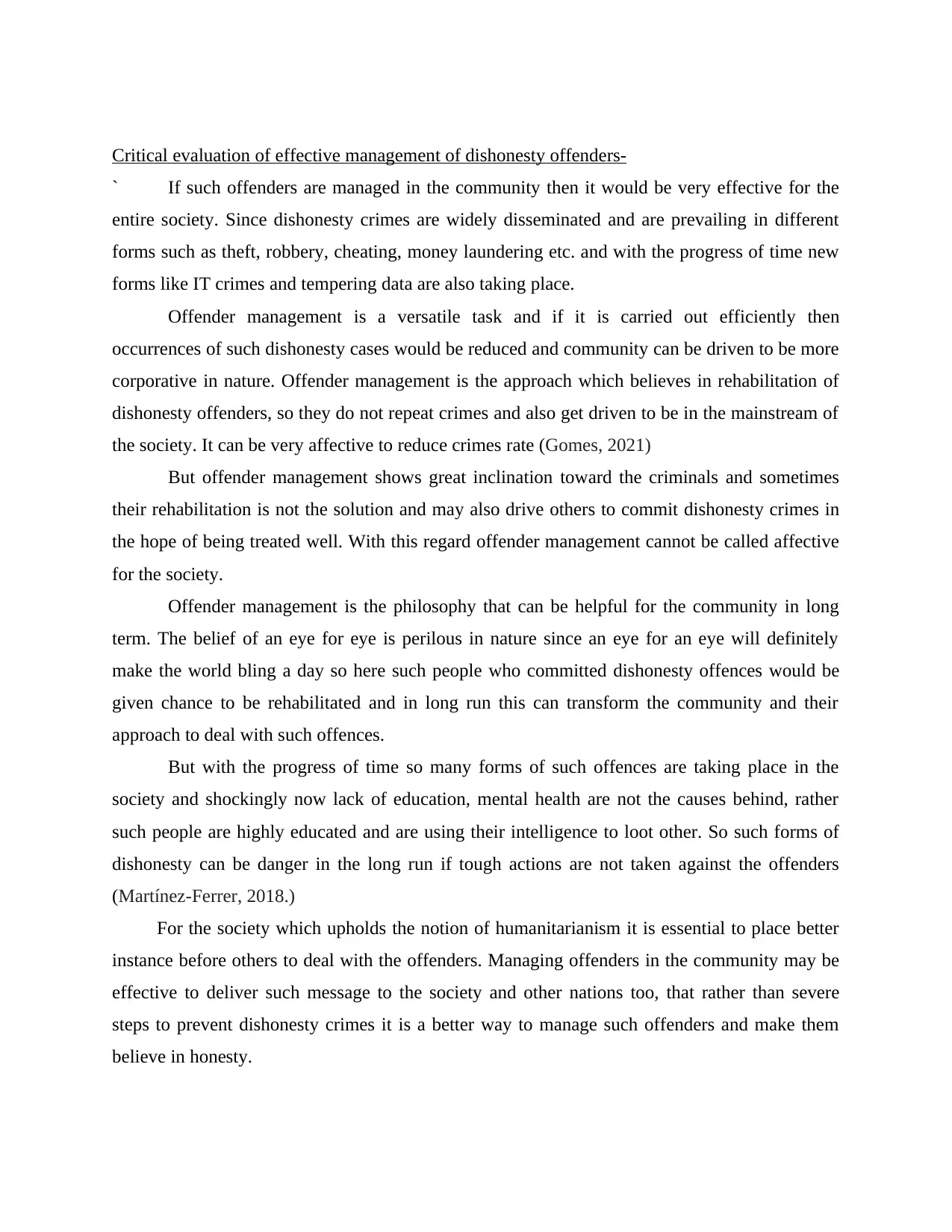
Critical evaluation of effective management of dishonesty offenders-
` If such offenders are managed in the community then it would be very effective for the
entire society. Since dishonesty crimes are widely disseminated and are prevailing in different
forms such as theft, robbery, cheating, money laundering etc. and with the progress of time new
forms like IT crimes and tempering data are also taking place.
Offender management is a versatile task and if it is carried out efficiently then
occurrences of such dishonesty cases would be reduced and community can be driven to be more
corporative in nature. Offender management is the approach which believes in rehabilitation of
dishonesty offenders, so they do not repeat crimes and also get driven to be in the mainstream of
the society. It can be very affective to reduce crimes rate (Gomes, 2021)
But offender management shows great inclination toward the criminals and sometimes
their rehabilitation is not the solution and may also drive others to commit dishonesty crimes in
the hope of being treated well. With this regard offender management cannot be called affective
for the society.
Offender management is the philosophy that can be helpful for the community in long
term. The belief of an eye for eye is perilous in nature since an eye for an eye will definitely
make the world bling a day so here such people who committed dishonesty offences would be
given chance to be rehabilitated and in long run this can transform the community and their
approach to deal with such offences.
But with the progress of time so many forms of such offences are taking place in the
society and shockingly now lack of education, mental health are not the causes behind, rather
such people are highly educated and are using their intelligence to loot other. So such forms of
dishonesty can be danger in the long run if tough actions are not taken against the offenders
(Martínez-Ferrer, 2018.)
For the society which upholds the notion of humanitarianism it is essential to place better
instance before others to deal with the offenders. Managing offenders in the community may be
effective to deliver such message to the society and other nations too, that rather than severe
steps to prevent dishonesty crimes it is a better way to manage such offenders and make them
believe in honesty.
` If such offenders are managed in the community then it would be very effective for the
entire society. Since dishonesty crimes are widely disseminated and are prevailing in different
forms such as theft, robbery, cheating, money laundering etc. and with the progress of time new
forms like IT crimes and tempering data are also taking place.
Offender management is a versatile task and if it is carried out efficiently then
occurrences of such dishonesty cases would be reduced and community can be driven to be more
corporative in nature. Offender management is the approach which believes in rehabilitation of
dishonesty offenders, so they do not repeat crimes and also get driven to be in the mainstream of
the society. It can be very affective to reduce crimes rate (Gomes, 2021)
But offender management shows great inclination toward the criminals and sometimes
their rehabilitation is not the solution and may also drive others to commit dishonesty crimes in
the hope of being treated well. With this regard offender management cannot be called affective
for the society.
Offender management is the philosophy that can be helpful for the community in long
term. The belief of an eye for eye is perilous in nature since an eye for an eye will definitely
make the world bling a day so here such people who committed dishonesty offences would be
given chance to be rehabilitated and in long run this can transform the community and their
approach to deal with such offences.
But with the progress of time so many forms of such offences are taking place in the
society and shockingly now lack of education, mental health are not the causes behind, rather
such people are highly educated and are using their intelligence to loot other. So such forms of
dishonesty can be danger in the long run if tough actions are not taken against the offenders
(Martínez-Ferrer, 2018.)
For the society which upholds the notion of humanitarianism it is essential to place better
instance before others to deal with the offenders. Managing offenders in the community may be
effective to deliver such message to the society and other nations too, that rather than severe
steps to prevent dishonesty crimes it is a better way to manage such offenders and make them
believe in honesty.
⊘ This is a preview!⊘
Do you want full access?
Subscribe today to unlock all pages.

Trusted by 1+ million students worldwide
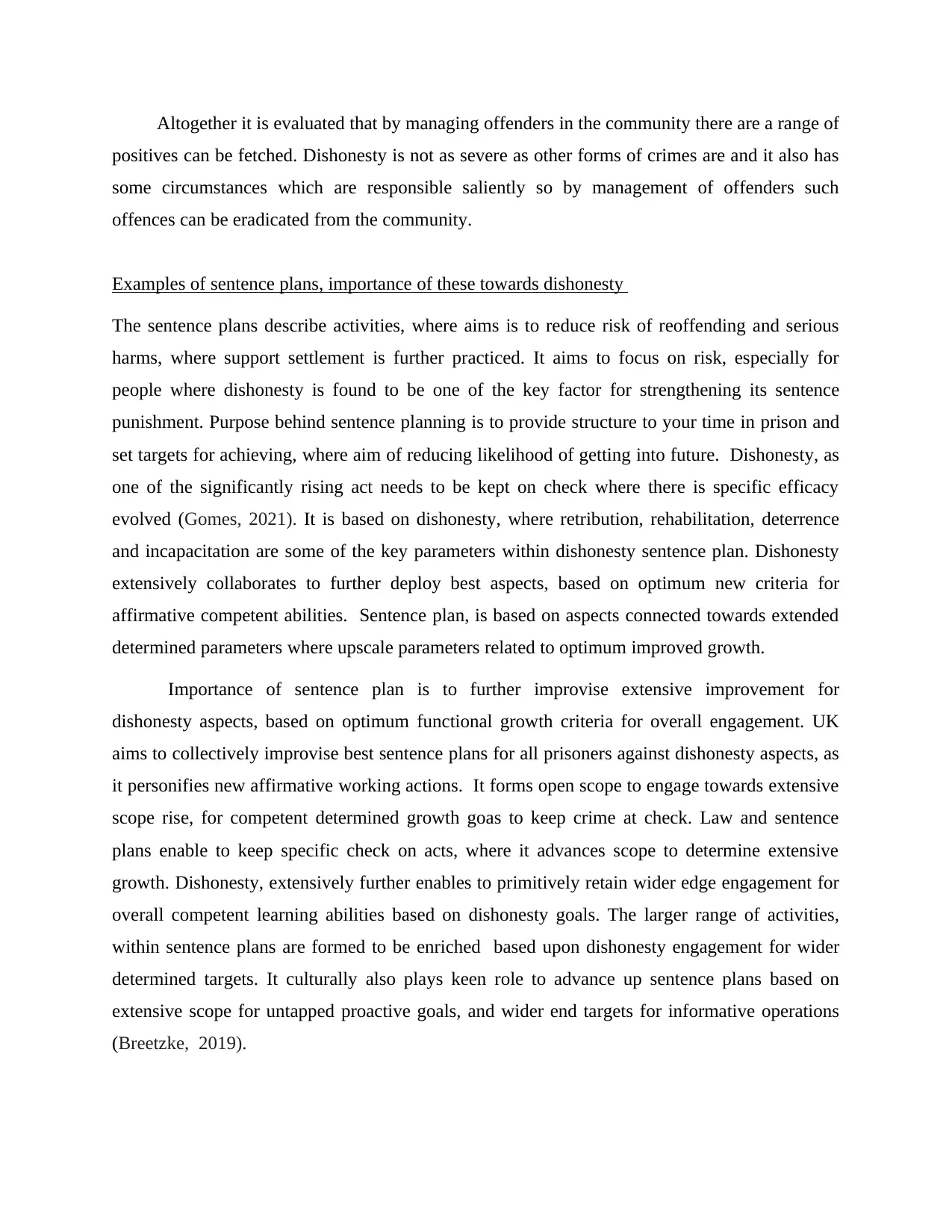
Altogether it is evaluated that by managing offenders in the community there are a range of
positives can be fetched. Dishonesty is not as severe as other forms of crimes are and it also has
some circumstances which are responsible saliently so by management of offenders such
offences can be eradicated from the community.
Examples of sentence plans, importance of these towards dishonesty
The sentence plans describe activities, where aims is to reduce risk of reoffending and serious
harms, where support settlement is further practiced. It aims to focus on risk, especially for
people where dishonesty is found to be one of the key factor for strengthening its sentence
punishment. Purpose behind sentence planning is to provide structure to your time in prison and
set targets for achieving, where aim of reducing likelihood of getting into future. Dishonesty, as
one of the significantly rising act needs to be kept on check where there is specific efficacy
evolved (Gomes, 2021). It is based on dishonesty, where retribution, rehabilitation, deterrence
and incapacitation are some of the key parameters within dishonesty sentence plan. Dishonesty
extensively collaborates to further deploy best aspects, based on optimum new criteria for
affirmative competent abilities. Sentence plan, is based on aspects connected towards extended
determined parameters where upscale parameters related to optimum improved growth.
Importance of sentence plan is to further improvise extensive improvement for
dishonesty aspects, based on optimum functional growth criteria for overall engagement. UK
aims to collectively improvise best sentence plans for all prisoners against dishonesty aspects, as
it personifies new affirmative working actions. It forms open scope to engage towards extensive
scope rise, for competent determined growth goas to keep crime at check. Law and sentence
plans enable to keep specific check on acts, where it advances scope to determine extensive
growth. Dishonesty, extensively further enables to primitively retain wider edge engagement for
overall competent learning abilities based on dishonesty goals. The larger range of activities,
within sentence plans are formed to be enriched based upon dishonesty engagement for wider
determined targets. It culturally also plays keen role to advance up sentence plans based on
extensive scope for untapped proactive goals, and wider end targets for informative operations
(Breetzke, 2019).
positives can be fetched. Dishonesty is not as severe as other forms of crimes are and it also has
some circumstances which are responsible saliently so by management of offenders such
offences can be eradicated from the community.
Examples of sentence plans, importance of these towards dishonesty
The sentence plans describe activities, where aims is to reduce risk of reoffending and serious
harms, where support settlement is further practiced. It aims to focus on risk, especially for
people where dishonesty is found to be one of the key factor for strengthening its sentence
punishment. Purpose behind sentence planning is to provide structure to your time in prison and
set targets for achieving, where aim of reducing likelihood of getting into future. Dishonesty, as
one of the significantly rising act needs to be kept on check where there is specific efficacy
evolved (Gomes, 2021). It is based on dishonesty, where retribution, rehabilitation, deterrence
and incapacitation are some of the key parameters within dishonesty sentence plan. Dishonesty
extensively collaborates to further deploy best aspects, based on optimum new criteria for
affirmative competent abilities. Sentence plan, is based on aspects connected towards extended
determined parameters where upscale parameters related to optimum improved growth.
Importance of sentence plan is to further improvise extensive improvement for
dishonesty aspects, based on optimum functional growth criteria for overall engagement. UK
aims to collectively improvise best sentence plans for all prisoners against dishonesty aspects, as
it personifies new affirmative working actions. It forms open scope to engage towards extensive
scope rise, for competent determined growth goas to keep crime at check. Law and sentence
plans enable to keep specific check on acts, where it advances scope to determine extensive
growth. Dishonesty, extensively further enables to primitively retain wider edge engagement for
overall competent learning abilities based on dishonesty goals. The larger range of activities,
within sentence plans are formed to be enriched based upon dishonesty engagement for wider
determined targets. It culturally also plays keen role to advance up sentence plans based on
extensive scope for untapped proactive goals, and wider end targets for informative operations
(Breetzke, 2019).
Paraphrase This Document
Need a fresh take? Get an instant paraphrase of this document with our AI Paraphraser
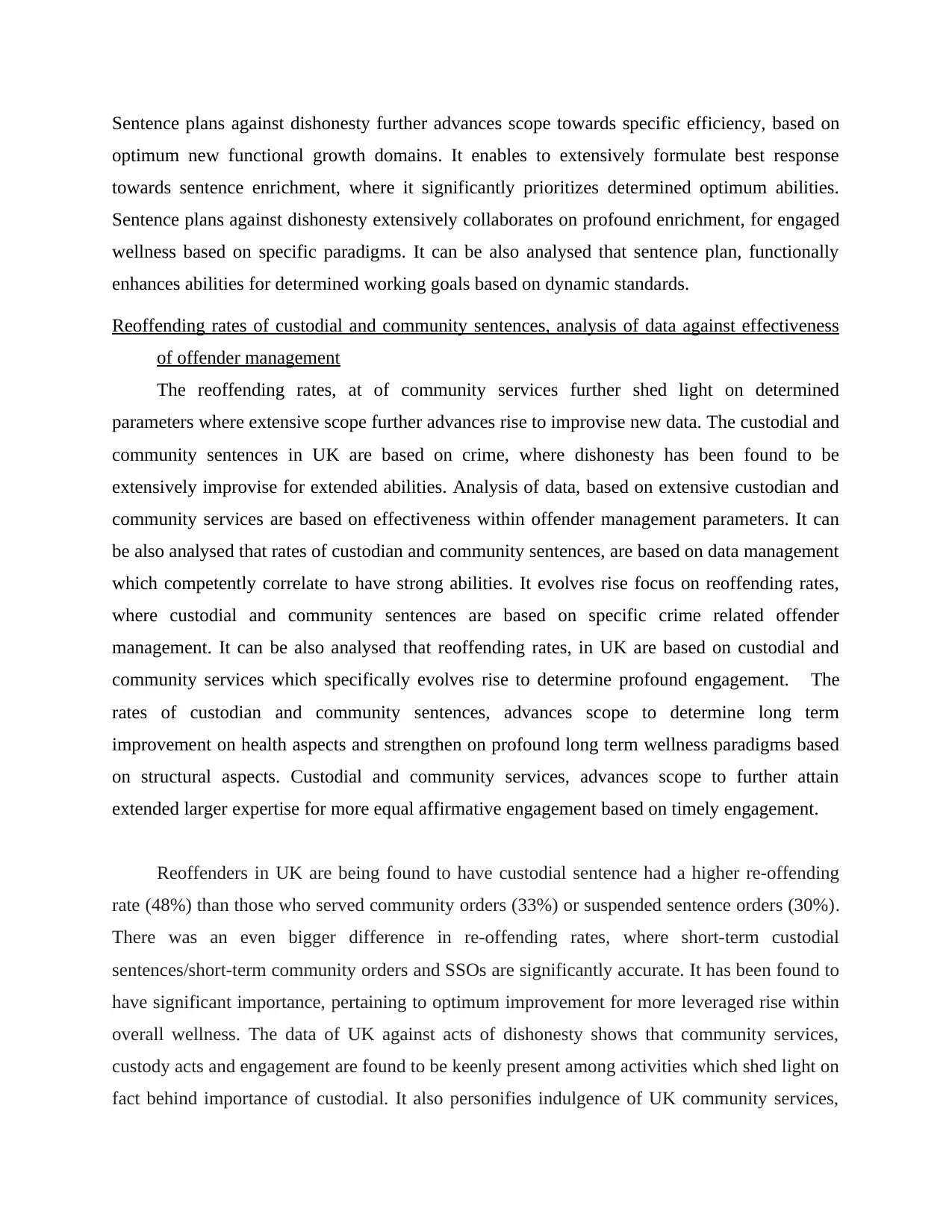
Sentence plans against dishonesty further advances scope towards specific efficiency, based on
optimum new functional growth domains. It enables to extensively formulate best response
towards sentence enrichment, where it significantly prioritizes determined optimum abilities.
Sentence plans against dishonesty extensively collaborates on profound enrichment, for engaged
wellness based on specific paradigms. It can be also analysed that sentence plan, functionally
enhances abilities for determined working goals based on dynamic standards.
Reoffending rates of custodial and community sentences, analysis of data against effectiveness
of offender management
The reoffending rates, at of community services further shed light on determined
parameters where extensive scope further advances rise to improvise new data. The custodial and
community sentences in UK are based on crime, where dishonesty has been found to be
extensively improvise for extended abilities. Analysis of data, based on extensive custodian and
community services are based on effectiveness within offender management parameters. It can
be also analysed that rates of custodian and community sentences, are based on data management
which competently correlate to have strong abilities. It evolves rise focus on reoffending rates,
where custodial and community sentences are based on specific crime related offender
management. It can be also analysed that reoffending rates, in UK are based on custodial and
community services which specifically evolves rise to determine profound engagement. The
rates of custodian and community sentences, advances scope to determine long term
improvement on health aspects and strengthen on profound long term wellness paradigms based
on structural aspects. Custodial and community services, advances scope to further attain
extended larger expertise for more equal affirmative engagement based on timely engagement.
Reoffenders in UK are being found to have custodial sentence had a higher re-offending
rate (48%) than those who served community orders (33%) or suspended sentence orders (30%).
There was an even bigger difference in re-offending rates, where short-term custodial
sentences/short-term community orders and SSOs are significantly accurate. It has been found to
have significant importance, pertaining to optimum improvement for more leveraged rise within
overall wellness. The data of UK against acts of dishonesty shows that community services,
custody acts and engagement are found to be keenly present among activities which shed light on
fact behind importance of custodial. It also personifies indulgence of UK community services,
optimum new functional growth domains. It enables to extensively formulate best response
towards sentence enrichment, where it significantly prioritizes determined optimum abilities.
Sentence plans against dishonesty extensively collaborates on profound enrichment, for engaged
wellness based on specific paradigms. It can be also analysed that sentence plan, functionally
enhances abilities for determined working goals based on dynamic standards.
Reoffending rates of custodial and community sentences, analysis of data against effectiveness
of offender management
The reoffending rates, at of community services further shed light on determined
parameters where extensive scope further advances rise to improvise new data. The custodial and
community sentences in UK are based on crime, where dishonesty has been found to be
extensively improvise for extended abilities. Analysis of data, based on extensive custodian and
community services are based on effectiveness within offender management parameters. It can
be also analysed that rates of custodian and community sentences, are based on data management
which competently correlate to have strong abilities. It evolves rise focus on reoffending rates,
where custodial and community sentences are based on specific crime related offender
management. It can be also analysed that reoffending rates, in UK are based on custodial and
community services which specifically evolves rise to determine profound engagement. The
rates of custodian and community sentences, advances scope to determine long term
improvement on health aspects and strengthen on profound long term wellness paradigms based
on structural aspects. Custodial and community services, advances scope to further attain
extended larger expertise for more equal affirmative engagement based on timely engagement.
Reoffenders in UK are being found to have custodial sentence had a higher re-offending
rate (48%) than those who served community orders (33%) or suspended sentence orders (30%).
There was an even bigger difference in re-offending rates, where short-term custodial
sentences/short-term community orders and SSOs are significantly accurate. It has been found to
have significant importance, pertaining to optimum improvement for more leveraged rise within
overall wellness. The data of UK against acts of dishonesty shows that community services,
custody acts and engagement are found to be keenly present among activities which shed light on
fact behind importance of custodial. It also personifies indulgence of UK community services,
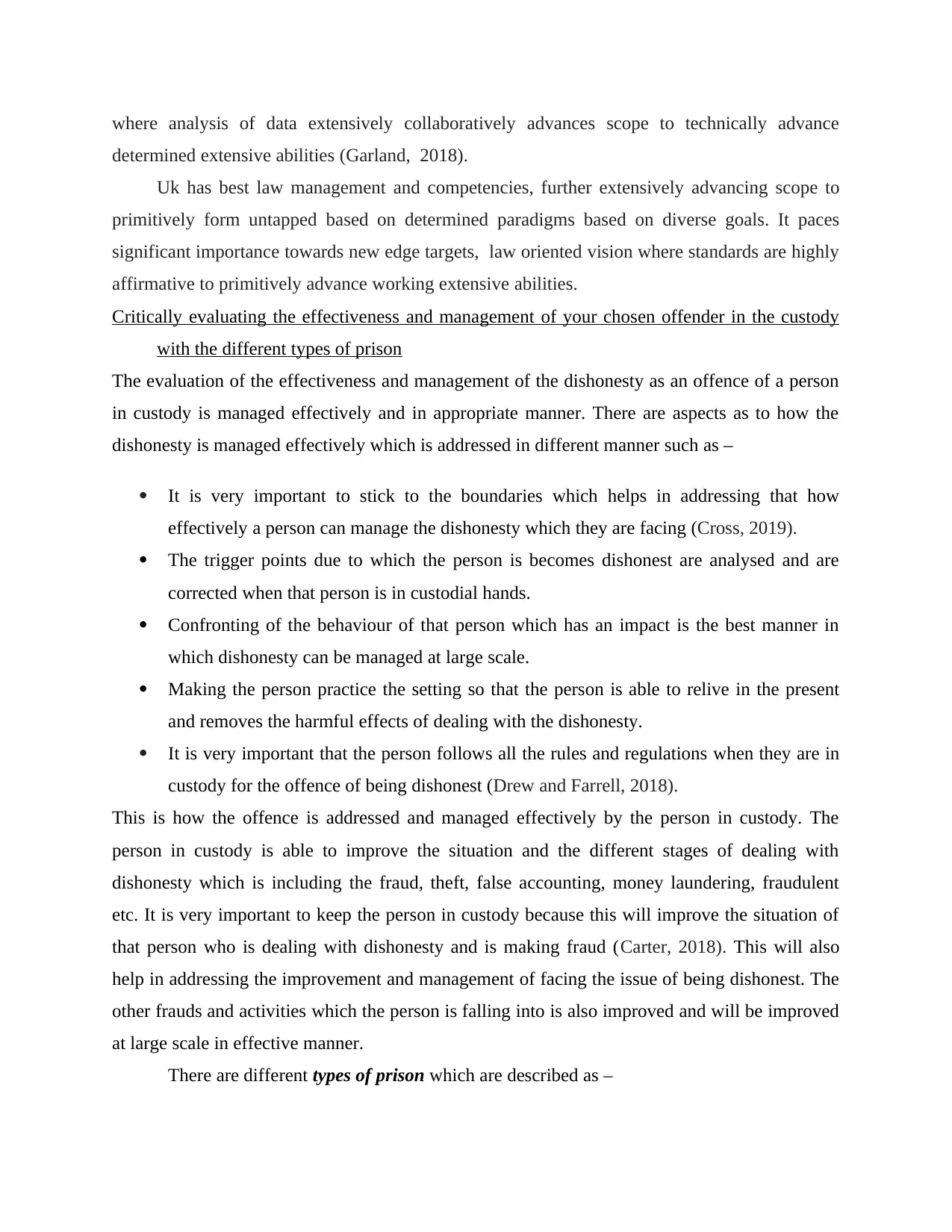
where analysis of data extensively collaboratively advances scope to technically advance
determined extensive abilities (Garland, 2018).
Uk has best law management and competencies, further extensively advancing scope to
primitively form untapped based on determined paradigms based on diverse goals. It paces
significant importance towards new edge targets, law oriented vision where standards are highly
affirmative to primitively advance working extensive abilities.
Critically evaluating the effectiveness and management of your chosen offender in the custody
with the different types of prison
The evaluation of the effectiveness and management of the dishonesty as an offence of a person
in custody is managed effectively and in appropriate manner. There are aspects as to how the
dishonesty is managed effectively which is addressed in different manner such as –
It is very important to stick to the boundaries which helps in addressing that how
effectively a person can manage the dishonesty which they are facing (Cross, 2019).
The trigger points due to which the person is becomes dishonest are analysed and are
corrected when that person is in custodial hands.
Confronting of the behaviour of that person which has an impact is the best manner in
which dishonesty can be managed at large scale.
Making the person practice the setting so that the person is able to relive in the present
and removes the harmful effects of dealing with the dishonesty.
It is very important that the person follows all the rules and regulations when they are in
custody for the offence of being dishonest (Drew and Farrell, 2018).
This is how the offence is addressed and managed effectively by the person in custody. The
person in custody is able to improve the situation and the different stages of dealing with
dishonesty which is including the fraud, theft, false accounting, money laundering, fraudulent
etc. It is very important to keep the person in custody because this will improve the situation of
that person who is dealing with dishonesty and is making fraud (Carter, 2018). This will also
help in addressing the improvement and management of facing the issue of being dishonest. The
other frauds and activities which the person is falling into is also improved and will be improved
at large scale in effective manner.
There are different types of prison which are described as –
determined extensive abilities (Garland, 2018).
Uk has best law management and competencies, further extensively advancing scope to
primitively form untapped based on determined paradigms based on diverse goals. It paces
significant importance towards new edge targets, law oriented vision where standards are highly
affirmative to primitively advance working extensive abilities.
Critically evaluating the effectiveness and management of your chosen offender in the custody
with the different types of prison
The evaluation of the effectiveness and management of the dishonesty as an offence of a person
in custody is managed effectively and in appropriate manner. There are aspects as to how the
dishonesty is managed effectively which is addressed in different manner such as –
It is very important to stick to the boundaries which helps in addressing that how
effectively a person can manage the dishonesty which they are facing (Cross, 2019).
The trigger points due to which the person is becomes dishonest are analysed and are
corrected when that person is in custodial hands.
Confronting of the behaviour of that person which has an impact is the best manner in
which dishonesty can be managed at large scale.
Making the person practice the setting so that the person is able to relive in the present
and removes the harmful effects of dealing with the dishonesty.
It is very important that the person follows all the rules and regulations when they are in
custody for the offence of being dishonest (Drew and Farrell, 2018).
This is how the offence is addressed and managed effectively by the person in custody. The
person in custody is able to improve the situation and the different stages of dealing with
dishonesty which is including the fraud, theft, false accounting, money laundering, fraudulent
etc. It is very important to keep the person in custody because this will improve the situation of
that person who is dealing with dishonesty and is making fraud (Carter, 2018). This will also
help in addressing the improvement and management of facing the issue of being dishonest. The
other frauds and activities which the person is falling into is also improved and will be improved
at large scale in effective manner.
There are different types of prison which are described as –
⊘ This is a preview!⊘
Do you want full access?
Subscribe today to unlock all pages.

Trusted by 1+ million students worldwide
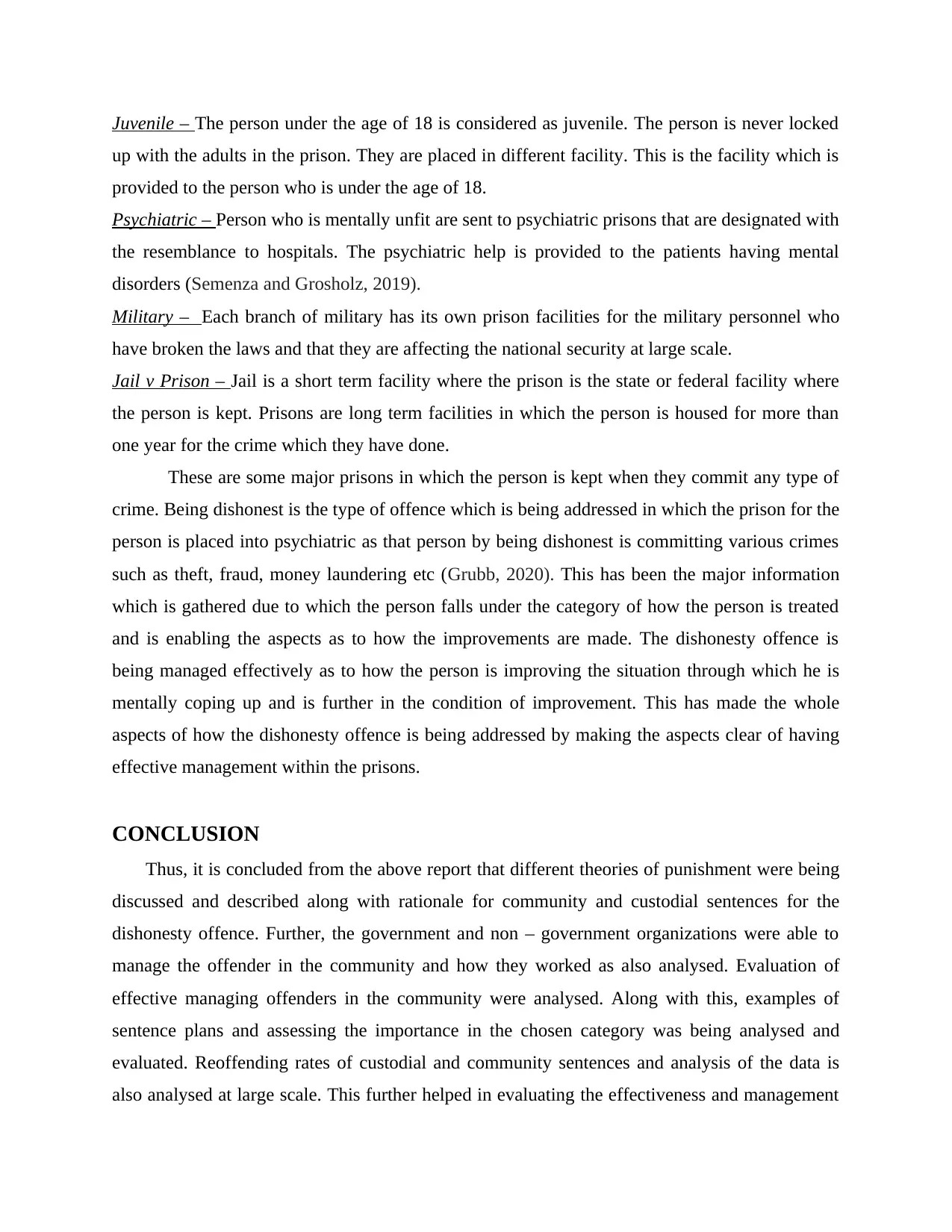
Juvenile – The person under the age of 18 is considered as juvenile. The person is never locked
up with the adults in the prison. They are placed in different facility. This is the facility which is
provided to the person who is under the age of 18.
Psychiatric – Person who is mentally unfit are sent to psychiatric prisons that are designated with
the resemblance to hospitals. The psychiatric help is provided to the patients having mental
disorders (Semenza and Grosholz, 2019).
Military – Each branch of military has its own prison facilities for the military personnel who
have broken the laws and that they are affecting the national security at large scale.
Jail v Prison – Jail is a short term facility where the prison is the state or federal facility where
the person is kept. Prisons are long term facilities in which the person is housed for more than
one year for the crime which they have done.
These are some major prisons in which the person is kept when they commit any type of
crime. Being dishonest is the type of offence which is being addressed in which the prison for the
person is placed into psychiatric as that person by being dishonest is committing various crimes
such as theft, fraud, money laundering etc (Grubb, 2020). This has been the major information
which is gathered due to which the person falls under the category of how the person is treated
and is enabling the aspects as to how the improvements are made. The dishonesty offence is
being managed effectively as to how the person is improving the situation through which he is
mentally coping up and is further in the condition of improvement. This has made the whole
aspects of how the dishonesty offence is being addressed by making the aspects clear of having
effective management within the prisons.
CONCLUSION
Thus, it is concluded from the above report that different theories of punishment were being
discussed and described along with rationale for community and custodial sentences for the
dishonesty offence. Further, the government and non – government organizations were able to
manage the offender in the community and how they worked as also analysed. Evaluation of
effective managing offenders in the community were analysed. Along with this, examples of
sentence plans and assessing the importance in the chosen category was being analysed and
evaluated. Reoffending rates of custodial and community sentences and analysis of the data is
also analysed at large scale. This further helped in evaluating the effectiveness and management
up with the adults in the prison. They are placed in different facility. This is the facility which is
provided to the person who is under the age of 18.
Psychiatric – Person who is mentally unfit are sent to psychiatric prisons that are designated with
the resemblance to hospitals. The psychiatric help is provided to the patients having mental
disorders (Semenza and Grosholz, 2019).
Military – Each branch of military has its own prison facilities for the military personnel who
have broken the laws and that they are affecting the national security at large scale.
Jail v Prison – Jail is a short term facility where the prison is the state or federal facility where
the person is kept. Prisons are long term facilities in which the person is housed for more than
one year for the crime which they have done.
These are some major prisons in which the person is kept when they commit any type of
crime. Being dishonest is the type of offence which is being addressed in which the prison for the
person is placed into psychiatric as that person by being dishonest is committing various crimes
such as theft, fraud, money laundering etc (Grubb, 2020). This has been the major information
which is gathered due to which the person falls under the category of how the person is treated
and is enabling the aspects as to how the improvements are made. The dishonesty offence is
being managed effectively as to how the person is improving the situation through which he is
mentally coping up and is further in the condition of improvement. This has made the whole
aspects of how the dishonesty offence is being addressed by making the aspects clear of having
effective management within the prisons.
CONCLUSION
Thus, it is concluded from the above report that different theories of punishment were being
discussed and described along with rationale for community and custodial sentences for the
dishonesty offence. Further, the government and non – government organizations were able to
manage the offender in the community and how they worked as also analysed. Evaluation of
effective managing offenders in the community were analysed. Along with this, examples of
sentence plans and assessing the importance in the chosen category was being analysed and
evaluated. Reoffending rates of custodial and community sentences and analysis of the data is
also analysed at large scale. This further helped in evaluating the effectiveness and management
Paraphrase This Document
Need a fresh take? Get an instant paraphrase of this document with our AI Paraphraser

of the dishonesty offender in custody which was explained in different type of prison at large
scale. This is how the report was being conducted on dishonesty offence which was framed
under the offender aspect effectively and in appropriate manner.
scale. This is how the report was being conducted on dishonesty offence which was framed
under the offender aspect effectively and in appropriate manner.
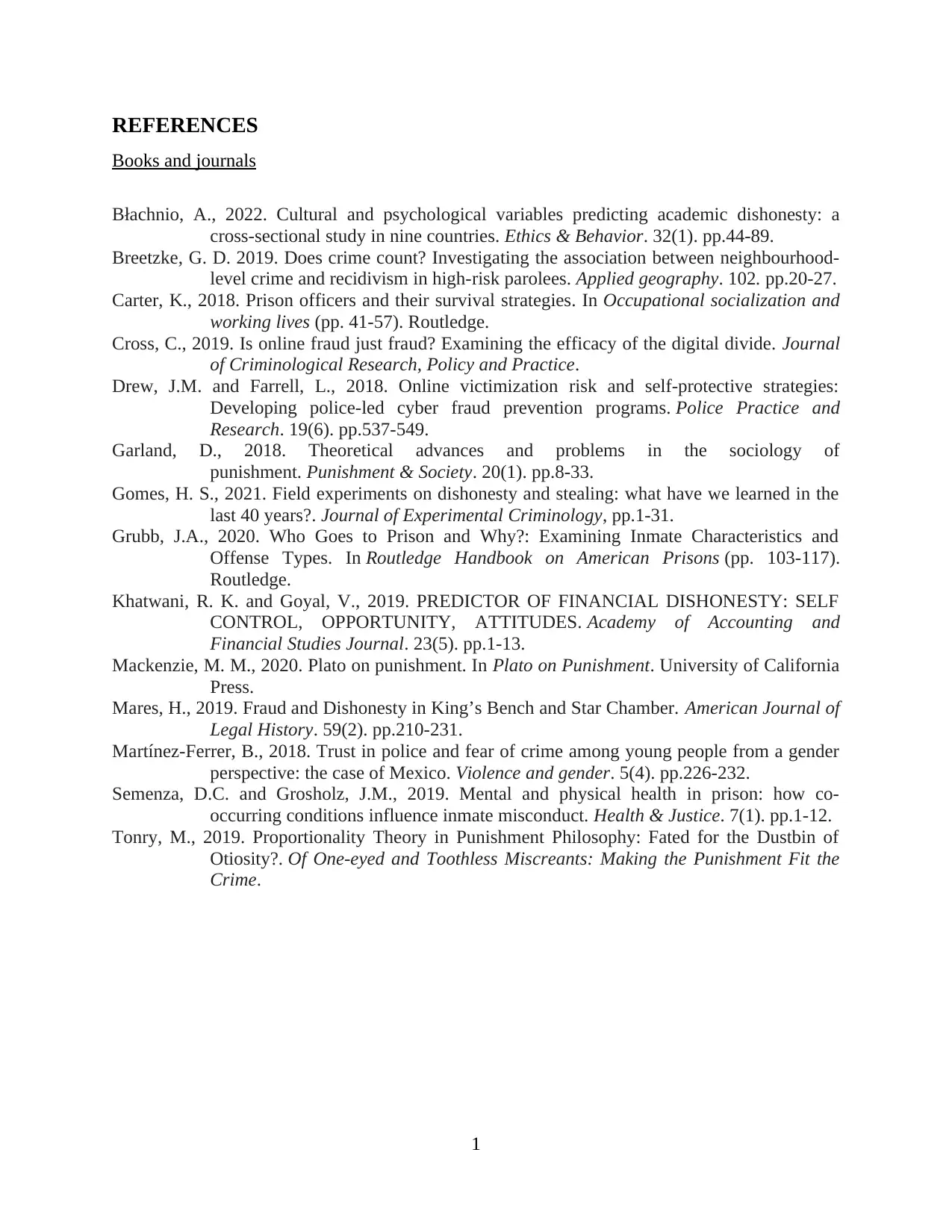
REFERENCES
Books and journals
Błachnio, A., 2022. Cultural and psychological variables predicting academic dishonesty: a
cross-sectional study in nine countries. Ethics & Behavior. 32(1). pp.44-89.
Breetzke, G. D. 2019. Does crime count? Investigating the association between neighbourhood-
level crime and recidivism in high-risk parolees. Applied geography. 102. pp.20-27.
Carter, K., 2018. Prison officers and their survival strategies. In Occupational socialization and
working lives (pp. 41-57). Routledge.
Cross, C., 2019. Is online fraud just fraud? Examining the efficacy of the digital divide. Journal
of Criminological Research, Policy and Practice.
Drew, J.M. and Farrell, L., 2018. Online victimization risk and self-protective strategies:
Developing police-led cyber fraud prevention programs. Police Practice and
Research. 19(6). pp.537-549.
Garland, D., 2018. Theoretical advances and problems in the sociology of
punishment. Punishment & Society. 20(1). pp.8-33.
Gomes, H. S., 2021. Field experiments on dishonesty and stealing: what have we learned in the
last 40 years?. Journal of Experimental Criminology, pp.1-31.
Grubb, J.A., 2020. Who Goes to Prison and Why?: Examining Inmate Characteristics and
Offense Types. In Routledge Handbook on American Prisons (pp. 103-117).
Routledge.
Khatwani, R. K. and Goyal, V., 2019. PREDICTOR OF FINANCIAL DISHONESTY: SELF
CONTROL, OPPORTUNITY, ATTITUDES. Academy of Accounting and
Financial Studies Journal. 23(5). pp.1-13.
Mackenzie, M. M., 2020. Plato on punishment. In Plato on Punishment. University of California
Press.
Mares, H., 2019. Fraud and Dishonesty in King’s Bench and Star Chamber. American Journal of
Legal History. 59(2). pp.210-231.
Martínez-Ferrer, B., 2018. Trust in police and fear of crime among young people from a gender
perspective: the case of Mexico. Violence and gender. 5(4). pp.226-232.
Semenza, D.C. and Grosholz, J.M., 2019. Mental and physical health in prison: how co-
occurring conditions influence inmate misconduct. Health & Justice. 7(1). pp.1-12.
Tonry, M., 2019. Proportionality Theory in Punishment Philosophy: Fated for the Dustbin of
Otiosity?. Of One-eyed and Toothless Miscreants: Making the Punishment Fit the
Crime.
1
Books and journals
Błachnio, A., 2022. Cultural and psychological variables predicting academic dishonesty: a
cross-sectional study in nine countries. Ethics & Behavior. 32(1). pp.44-89.
Breetzke, G. D. 2019. Does crime count? Investigating the association between neighbourhood-
level crime and recidivism in high-risk parolees. Applied geography. 102. pp.20-27.
Carter, K., 2018. Prison officers and their survival strategies. In Occupational socialization and
working lives (pp. 41-57). Routledge.
Cross, C., 2019. Is online fraud just fraud? Examining the efficacy of the digital divide. Journal
of Criminological Research, Policy and Practice.
Drew, J.M. and Farrell, L., 2018. Online victimization risk and self-protective strategies:
Developing police-led cyber fraud prevention programs. Police Practice and
Research. 19(6). pp.537-549.
Garland, D., 2018. Theoretical advances and problems in the sociology of
punishment. Punishment & Society. 20(1). pp.8-33.
Gomes, H. S., 2021. Field experiments on dishonesty and stealing: what have we learned in the
last 40 years?. Journal of Experimental Criminology, pp.1-31.
Grubb, J.A., 2020. Who Goes to Prison and Why?: Examining Inmate Characteristics and
Offense Types. In Routledge Handbook on American Prisons (pp. 103-117).
Routledge.
Khatwani, R. K. and Goyal, V., 2019. PREDICTOR OF FINANCIAL DISHONESTY: SELF
CONTROL, OPPORTUNITY, ATTITUDES. Academy of Accounting and
Financial Studies Journal. 23(5). pp.1-13.
Mackenzie, M. M., 2020. Plato on punishment. In Plato on Punishment. University of California
Press.
Mares, H., 2019. Fraud and Dishonesty in King’s Bench and Star Chamber. American Journal of
Legal History. 59(2). pp.210-231.
Martínez-Ferrer, B., 2018. Trust in police and fear of crime among young people from a gender
perspective: the case of Mexico. Violence and gender. 5(4). pp.226-232.
Semenza, D.C. and Grosholz, J.M., 2019. Mental and physical health in prison: how co-
occurring conditions influence inmate misconduct. Health & Justice. 7(1). pp.1-12.
Tonry, M., 2019. Proportionality Theory in Punishment Philosophy: Fated for the Dustbin of
Otiosity?. Of One-eyed and Toothless Miscreants: Making the Punishment Fit the
Crime.
1
⊘ This is a preview!⊘
Do you want full access?
Subscribe today to unlock all pages.

Trusted by 1+ million students worldwide
1 out of 13
Related Documents
Your All-in-One AI-Powered Toolkit for Academic Success.
+13062052269
info@desklib.com
Available 24*7 on WhatsApp / Email
![[object Object]](/_next/static/media/star-bottom.7253800d.svg)
Unlock your academic potential
Copyright © 2020–2026 A2Z Services. All Rights Reserved. Developed and managed by ZUCOL.





